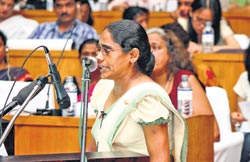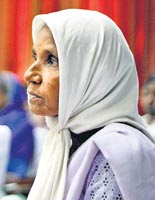
HIV/AIDS-affected women take woes before “court”Twenty women infected with HIV, who were accused, abused and expelled from their marital homes narrated their tales of woe when they appeared before the First Asia Pacific Court for Women on HIV and inheritance and property rights. The ‘court’ came into session at the BMICH yesterday as part of the 8th International Congress on AIDS in Asia and the Pacific (ICAAP). The women from Sri Lanka, Bangladesh, India, Nepal, Pakistan, Malaysia, Cambodia, Vietnam, Thailand, Papua New Guinea and South Africa giving their testimony said how they were dispossessed of their inheritance and property rights by their families and by society because of their infection. A mother of two, the Sri Lankan representative of AIDS victims said it was in 2001 that she found out she was HIV positive and this was the beginning of her agony.
“After my husband returned from Germany and began working in a hotel at Piliyandala in 2001 he often fell sick and it was then that the doctors confirmed he was HIV positive. The folks in the village didn’t know about the HIV except that he was suffering from a severe disease,” the Sri Lankan representative said. She said her life took a turn for the worse when a minor employee of the hospital exposed the truth about her husband to the villagers.“Our daughters were expelled from school and the villagers ignored us while insisting we leave the village without spreading AIDS in the village,” the woman said. She said her husband left her leaving behind a letter and a few days later, he was found near a temple in Colombo.“He had taken poison. The doctors couldn’t save his life,” the woman said. She said the village had by now turned hostile with the villagers who had gradually became strangers compelling the now broken family to leave home.“My two daughters and I could not to step outside the house for fear of being assaulted by the villagers and for four days we were virtually starving without any food in the house. “On the fourth day the villagers, roused up by my husband’s brother who was eying our property, set the house on fire,” the woman alleged. She said that we now live in a room provided by the Salvation Army while her brother-in-law occupied the house and property that were registered under the name of her husband and her. “I wanted to go to courts but lawyers were reluctant to take up my case” the woman lamented. The HIV-affected woman from India relating her tale of woe said she was well educated and from a respected family in Chennai. She fell in love with her fiancé and married him. Now a mother of one she later came to know that her husband had many illicit love affairs.
“I miscarried several times and after five such miscarriages I checked myself for HIV because at school I learnt of some of its symptoms. I found I am HIV positive. “My husband and I thought the whole family should commit suicide but when we checked whether our child was HIV positive and found out she was not we decided that for the child’s sake we must live,” the woman from India said. She said in three months her husband died and her in-laws blamed her for his death.“I handed over my daughter to an orphanage fearing that she may get infected and without a job I had no way of providing her with food either. I starved for many days as nobody was willing to give me a job or any food” the woman said. She said sometime later she got a job through the Positive Network as an ICTC counsellor and now lived with her daughter. The woman said her father filed a case against her relating to property inheritance and had refused to support her daughter in providing for her education. The AIDS victim from Nepal said she was forced into marriage at the age of 12 and was exploited at her husband’s house and unable to put up with it any longer she escaped and returned to her parent’s home but her parents forced her to go back to her marital home.
“On the way, I managed to escape and a kind lady helped me. She said her sister was working for a factory in another part of Nepal and I can join and all that need to be done was to sell the clothes from the factory,” she said. On the way the two of them had been drugged and taken to India. “It was then that I got to know that I was sold for 15,000 Indian rupees. I was beaten when she I refused to be a sex worker. “For one year I was trapped in the brothel and later the police raided the house of ill-fame and I was rescued and sent back to Nepal. By then I was 14 years old,” the Nepali woman said. She said her parents refused to her accept her as she was by now found to be HIV positive, a second check up found the initial diagnosis was wrong and later she got married and had a child but recently another test had found her to be HIV positive.“My husband and my daughter don’t know I’m HIV positive or else they will chase me and make my life miserable” she said. A recent UNDP socio-economic impact study and the National Council for Applied Economic Research (NCAER) done in India show that 79 % of the AIDS widows in the country were denied a share of their husbands’ property and 90 % were expelled from their marital homes with indignity, humiliation and discrimination. The “court” brought to the public’s atention the challenges faced by women in the context of HIV/AIDS.
|
|| Front
Page | News | Editorial | Columns | Sports | Plus | Financial
Times | International | Mirror | TV
Times | Funday
Times || |
| |
Copyright
2007 Wijeya
Newspapers Ltd.Colombo. Sri Lanka. |


